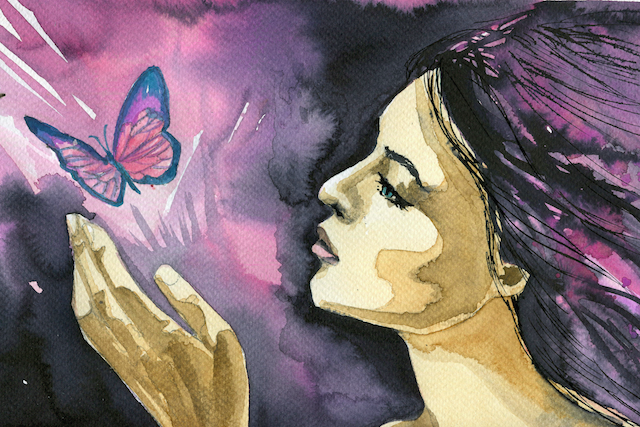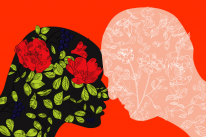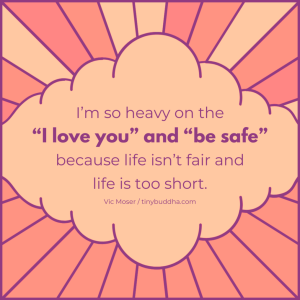
“Grief, when it comes, is nothing like we expect it to be.” ~Joan Didion
This spring marked ten years since I lost my mother. One ordinary Thursday, she didn’t show up to work, and my family spent a blur of days frantically hanging missing person fliers, driving all over New England, and hoping against reason for a happy outcome.
My mother was prone to frequent mood swings, but she also talked to my two older brothers and me multiple times a day, and going off the grid was completely out of character. How does someone just vanish? And why?
Forty days is a long time to brood over worst-case scenarios: murder, kidnap, dissociative fugue cycled through my addled mind. I gave in to despair but always managed to buoy myself up with hope. My mom was my best friend, and at twenty years old, I needed her too much to lose her. She simply had to come home.
Six weeks later, my brother called. Right up front he said he loved me—a sure sign bad news was coming. There was no way to say what he had to say next, so he just spat it out like sour milk: our mother’s body had been found.
A diver checking moorings in a cold New England harbor had spotted something white on the ocean floor. That white whale was our mom’s station wagon. She had driven off the end of a pier. We didn’t say the word suicide, but we both thought it, failed to comprehend it.
It’s been ten years since that terrible spring. Much of it still doesn’t make sense to me, but a decade has softened the rawness of my grief and allowed moments of lightness to find their way back into my life, the way sunrise creeps around the edges of a drawn window shade.
Losing someone to suicide makes you certain you’ll never see another sunrise, much less appreciate one. It isn’t true. I’m thirty years old now and my life is bigger, scarier, and more fulfilling than I ever could have imagined. Grief helped get me here.
Grief is not something you can hack. There is no listicle that can reassemble your busted heart. But I have found that grieving can make your life richer in unexpected ways. Here are ten truths the biggest loss of my life has taught me:
1. Dying is really about living.
At my mother’s memorial, I resented everyone who said some version of that old platitude, “Time heals all wounds.” Experience has taught me that time doesn’t offer a linear healing process so much as a slowly shifting perspective.
In the first raw months and years of grieving, I pushed away family and friends, afraid that they would leave too. With time, though, I’ve forged close relationships and learned to trust again. Grief wants you to go it alone, but we need others to light the way through that dark tunnel.
2. No one will fill that void.
I have a mom-shaped hole in my heart. Turns out it’s not a fatal condition, but it is a primal spot that no one will ever fill. For a long time, I worried that with the closest relationship in my life suddenly severed, I would never feel whole again. Who would ever understand me in all the ways my mother did?
These days I have strong female role models in my life, but I harbor no illusions that any of them will take my mom’s place. I’ve slowly been able to let go of the guilt that I was replacing or dishonoring her by making room for others. Healing is not an act of substituting, but of expanding, despite the holes we carry.
3. Be easy on yourself.
In the months after losing my mother, I was clumsy, forgetful and foggy. I can’t recall any of the college classes I took during that time. Part of my grieving process entailed beating myself up for what I could not control, and my brain fog felt like yet another failure.
In time, the fog lifted and my memories returned. I’ve come to see this as my mind going into survival mode with its own coping mechanisms.
Being kind to myself has never been my strong suit, and grief likes to make guilt its sidekick. Meditation, yoga, and journaling are three practices that help remind me that kindness is more powerful than listening to my inner saboteur.
4. Use whatever works.
I’m not a Buddhist, but I find the concept of letting go and not clinging to anything too tightly to be powerful.
I don’t read self-help, but I found solace in Joan Didion’s memoir The Year of Magical Thinking.
I’m not religious, but I found my voice in a campus support group run by a chaplain.
I hadn’t played soccer since I was a kid, but I joined an adult recreational league and found that I could live completely in the moment while chasing a ball around a field.
There isn’t a one-size-fits-all grieving method. Much of it comes down to flailing around until you find what works. Death is always unexpected; so too are the ways we heal.
5. Gratitude wins.
We always feel that we lost a loved one too soon. My mom gave me twenty good years. Of course I would’ve liked more time, but self-pity and gratitude are flipsides of the same coin; choosing the latter will serve you in positive ways, while the former gives you absolutely nothing.
6. Choose to thrive.
My mom and I share similar temperaments. After her death, I worried I was also destined for an unhappy outcome. This is one of the many tricks that grief plays: it makes you think you don’t deserve happiness.
It’s easier to self-destruct than it is to practice self-care. I initially coped through alcohol and other destructive methods, but I knew this was only clouding my grieving process. I had to face the pain directly, and write my way through it. So I wrote a book.
Everyone has their own constructive coping mechanisms, and choosing those, even when it’s hard, is worth it in the long run. My mother may not have been able to find happiness in her own life, but I know she would want that for me. No one is going to water you like a plant—you have to choose to thrive.
7. Time heals, but on its own timeline.
“Time heals all wounds” is something I heard a lot at my mother’s memorial service. Here’s what I wish I had known: grief time does not operate like normal time. In the first year, the present was obscured entirely by the past. Grieving demanded that I revisit every detail leading up to losing my mom.
As I slowly started to find effective coping mechanisms, I began to feel more rooted in the present. My mood did not have to be determined by the hurts of the past.
There will always be good days and bad. This is the bargain we sign on for as humans. Once we make it through the worst days, we gain a heightened sense of appreciation for the small moments of joy to be found in normal days. Healing comes over time, but only if we’re willing to do the work of grieving.
8. Let your loss highlight your gains.
I’ve lived in New York City for eight years now, but it still shocks me that I’ve built a life that I love here. It’s a gift I attribute to my mom. She was always supportive of my stubborn desire to pursue a career as a writer. After she died, the only thing that made sense to me was to write about the experience.
This led me to grad school in New York, a place I had never even considered living before. It feels like home now. I wish I could share it with my mom, but it was her belief in me that got me here. I lost my mom, but I found a home, good friends, a career I love and the perspective to appreciate it all.
9. Heartbreak is a sign of progress.
In the first years after the big loss, I assumed romance was dead to me. Why would I allow someone else to break my heart? Luckily I got past this fear to the point where I was able to experience a long and loving relationship.
That relationship eventually imploded, but I did not, which strikes me as a sign of progress. Grief makes us better equipped to weather the other life losses that are sure to come. This is not pessimism. This is optimism that the rewards of love always trump its risks.
10. Grief makes us beginners.
Death is the only universal, and grieving makes beginners out of all of us. Yet grief affects us all in different ways. There is no instruction manual on how best to cope.
There is only time, day by day and sometimes minute by minute, to feel what works, and to cast aside what does not. In the ten years I’ve learned to live without my mother, I’ve tried to see my grieving process as an evolutionary one. Loss has enriched my life in challenging, unexpected, and maybe even beautiful ways.
About Lindsay Harrison
Lindsay Harrison is a New York based writer and editor. Her first book, Missing, was published by Simon & Schuster. When she's not writing, she's most likely playing soccer or walking her dog, who looks like a fox.













 Though I run this site, it is not mine. It's ours. It's not about me. It's about us. Your stories and your wisdom are just as meaningful as mine.
Though I run this site, it is not mine. It's ours. It's not about me. It's about us. Your stories and your wisdom are just as meaningful as mine.